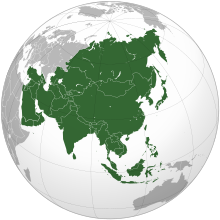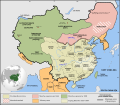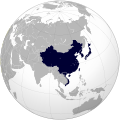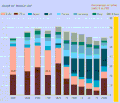Portal:Asia

 Asia (/ˈeɪʒə/ ⓘ AY-zhə, UK also /ˈeɪʃə/ AY-shə) is the largest continent in the world by both land area and population. It covers an area of more than 44 million square kilometers, about 30% of Earth's total land area and 8% of Earth's total surface area. The continent, which has long been home to the majority of the human population, was the site of many of the first civilizations. Its 4.7 billion people constitute roughly 60% of the world's population. Asia shares the landmass of Eurasia with Europe, and of Afro-Eurasia with both Europe and Africa. In general terms, it is bounded on the east by the Pacific Ocean, on the south by the Indian Ocean, and on the north by the Arctic Ocean. The border of Asia with Europe is a historical and cultural construct, as there is no clear physical and geographical separation between them. It is somewhat arbitrary and has moved since its first conception in classical antiquity. The division of Eurasia into two continents reflects East–West cultural, linguistic, and ethnic differences, some of which vary on a spectrum rather than with a sharp dividing line. A commonly accepted division places Asia to the east of the Suez Canal separating it from Africa; and to the east of the Turkish Straits, the Ural Mountains and Ural River, and to the south of the Caucasus Mountains and the Caspian and Black seas, separating it from Europe. China and India traded places as the largest economies in the world from 1 to 1800 CE. China was a major economic power for much of recorded history, with the highest GDP per capita until 1500. The Silk Road became the main east–west trading route in the Asian hinterlands while the Straits of Malacca stood as a major sea route. Asia has exhibited economic dynamism as well as robust population growth during the 20th century, but overall population growth has since fallen. Asia was the birthplace of most of the world's mainstream religions including Hinduism, Zoroastrianism, Judaism, Jainism, Buddhism, Confucianism, Taoism, Christianity, Islam, Sikhism, as well as many other religions. (Full article...) Featured article Andhra Pradesh (English: /ˌɑːndrə prəˈdɛʃ/, Telugu: [aːndʱrɐ prɐdeːʃ] ⓘ abbr. AP) is a state in the southern coastal region of India. It is the seventh-largest state with an area of 162,970 km2 (62,920 sq mi) and the tenth-most populous state with 49,577,103 inhabitants. It shares borders with Chhattisgarh, Odisha, Karnataka, Tamil Nadu, Telangana and the Bay of Bengal. It has the second-longest coastline in India at about 974 km (605 mi). After existence as Andhra State and unified Andhra Pradesh, the state took its present form on 2 June 2014, when the new state of Telangana was formed through bifurcation. Amaravati is the capital of the state, with the largest city being Visakhapatnam. Water sharing disputes and asset division with Telangana are not yet resolved. Telugu, one of the classical languages of India used by the majority of people, is the first official language. As per the 8th century BCE Rigvedic text Aitareya Brahmana, the Andhras left North India off the banks of the Yamuna river and migrated to South India. In the third century BCE, Andhra was a vassal kingdom of Ashoka of the Mauryan Empire. After his death, it became powerful and extended its empire to the whole Maratha country and beyond under the rule of the Satavahana dynasty. After that, the major rulers included the Pallavas, Eastern Chalukyas, Kakatiyas, Vijayanagara Empire, Qutb Shahi dynasty, Nizam dynasty, East India Company, and British Raj. (Full article...)Selected Country Iran, also known as Persia and officially the Islamic Republic of Iran (IRI), is a country in West Asia. It is bordered by Iraq to the west and Turkey to the northwest, Azerbaijan, Armenia, the Caspian Sea and Turkmenistan to the north, Afghanistan to the east, Pakistan to the southeast, the Gulf of Oman and the Persian Gulf to the south. With a mostly Persian-ethnic population of almost 90 million in an area of 1,648,195 km² (636,372 sq mi), Iran ranks 17th globally in both geographic size and population. It is the sixth-largest country entirely in Asia, the second-largest in West Asia, and one of the world's most mountainous countries. Officially an Islamic republic, Iran has a Muslim-majority population. The country is divided into five regions with 31 provinces. The nation's capital and most populous city is Tehran, with around 16 million people in its metropolitan area. Other major cities include Mashhad, Isfahan, Karaj, and Shiraz. Iran is one of the world's oldest civilizations, beginning with the Elamites in the fourth millennium BC. It was first unified as a state by the Medes in the seventh century BC and reached its territorial height in the sixth century BC, when Cyrus the Great founded the Achaemenid Empire, one of the largest and most powerful empires in ancient history. Alexander the Great conquered the empire in the fourth century BC, subsequently dividing Iran into several Hellenistic states. An Iranian rebellion established the Parthian Empire in the third century BC, which was succeeded in the third century AD by the Sasanian Empire. Muslims conquered the region in the seventh century AD, leading to Iran's Islamization. Iran became a major centre of Islamic culture and learning, and its culture, language, and customs spread across the Muslim world. A series of native Iranian Muslim dynasties ruled the country until the Seljuk and the Mongol conquests of the 11th to 14th centuries. In the 16th century, the native Safavids re-established a unified Iranian state with Twelver Shia Islam as the official religion, marking the beginning of modern Iranian history. (Full article...)Featured biographyAntiochus X Eusebes Philopator (Ancient Greek: Ἀντίοχος Εὐσεβής Φιλοπάτωρ; c. 113 BC – 92 or 88 BC) was a Seleucid monarch who reigned as King of Syria during the Hellenistic period between 95 BC and 92 BC or 89/88 BC (224 SE [Seleucid year]). He was the son of Antiochus IX and perhaps his Egyptian wife Cleopatra IV. Eusebes lived during a period of general disintegration in Seleucid Syria, characterized by civil wars, foreign interference by Ptolemaic Egypt and incursions by the Parthians. Antiochus IX was killed in 95 BC at the hands of Seleucus VI, the son of his half-brother and rival Antiochus VIII. Antiochus X then went to the city of Aradus where he declared himself king. He avenged his father by defeating Seleucus VI, who was eventually killed. Antiochus X did not enjoy a stable reign as he had to face three of Seleucus VI's brothers, Antiochus XI, Philip I and Demetrius III. Antiochus XI defeated Antiochus X and expelled him from the capital Antioch in 93 BC. A few months later, Antiochus X regained his position and killed Antiochus XI. This led to both Philip I and Demetrius III becoming involved. The civil war continued but its outcome is uncertain due to the contradictions between different ancient historians' accounts. Antiochus X married his stepmother, Antiochus IX's widow Cleopatra Selene, and had several children with her, including a future king Antiochus XIII. (Full article...)General imagesThe following are images from various Asia-related articles on Wikipedia. Featured picture Credit: Shahee Ilyas An aerial photo of Malé, the capital of the Republic of Maldives. Malé is located on Malé Island in the Kaafu Atoll, but administratively it is not considered part of Kaafu. The island is heavily urbanised, with the city, one of the most densely populated in the world, taking up essentially its entire landmass.
Did you know...
Updated: 6:33, 14 February 2024 In the news
Related portalsMajor Religions in Asia Middle East Central Asia and Surroundings Indian Subcontinent Southeast Asia East Asia Selected panorama
Bangalore, is the capital of the Indian state of Karnataka. It has a population of over ten million, making it a megacity and the third-most populous city and fifth-most populous urban agglomeration in India. TopicsCategoriesAssociated WikimediaThe following Wikimedia Foundation sister projects provide more on this subject:
More portalsShortcuts to this page: Asia portal • P:ASIA Purge server cache |





























































































